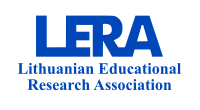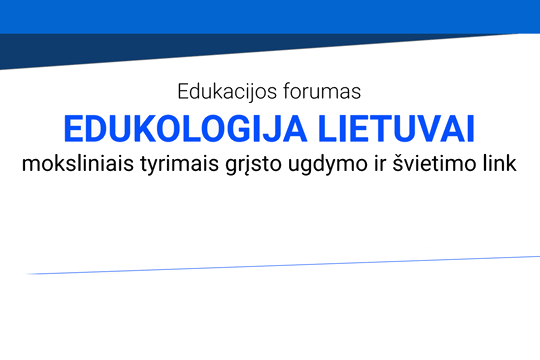XVIII EDUCATION FORUM “The Future of the Lithuanian General Education School. What Shall We Count: Do We Calculate or Imagine?”
We are kindly invite representatives of educational sciences, researchers, doctoral students, heads of general education schools and community representatives, educational policy makers, everyone who is interested in changes in education policy, general education and education research to participate.
About the main presenter
Professor Lilija Duoblienė is a professor at the Faculty of Philosophy of Vilnius University. She heads the Department of Educational Theory and Culture of the Institute of Educational Sciences. The professor’s field of research includes educational philosophy and ideology, cultural innovations and cultural encounters in education, and her research is based on critical pedagogy, postmodernism and posthumanism. approaches.
Lilija Duoblienė has led many national research groups on the topic of educational culture and cultural transmission (2010, 2014-2015), participated in the national research project “Multimodal education: philosophical approaches and problems”, as well as in the DIALLS project dedicated to international dialogue and cultural literacy (“Horizontas 2020 “), is currently leading the scientific group project “Futuristic Projections of the Lithuanian General Education School” (2020-2022). The professor is the author of many articles and several monographs, including “Ideologized Territories of Educational Change” (2011), “Posthumanist Education. Decode” (2018), “Multimodal Education: Philosophy and Practice” (co-author, 2021).
Lilija Duoblienė has led many national research groups on the topic of educational culture and cultural transmission (2010, 2014-2015), participated in the national research project “Multimodal education: philosophical approaches and problems”, as well as in the DIALLS project dedicated to international dialogue and cultural literacy (“Horizontas 2020 “), is currently leading the scientific group project “Futuristic Projections of the Lithuanian General Education School” (2020-2022). The professor is the author of many articles and several monographs, including “Ideologized Territories of Educational Change” (2011), “Posthumanist Education. Decode” (2018), “Multimodal Education: Philosophy and Practice” (co-author, 2021).
| Date | October 27, 2022 |
| Time | 3.00–5.00 p.m. |
| Connecting links | College Hall https://zoom.us/j/6289736970 (live translation) https://www.youtube.com/channel/UCHxFzyS1l3eAxn-gXT4BHbQ |
| Moderators | assoc. prof. Irena Stonkuvienė, Institute of Educational Sciences, Faculty of Philosophy, Vilnius University Ričardas Ališauskas, Head of the Strategic Planning Department of the Ministry of Education, Science and Sports of the Republic of Lithuania |
| Forum programme (project) | |
| Key – note | Topic “The Future of the Lithuanian General Education School. What Will We Count : Do We Calculate or Imagine?” Prof. dr. Lilija Duoblienė, professor of the Institute of Educational Sciences, Faculty of Philosophy, Vilnius University. The report was prepared under the LMT-funded project “Futuristic Projections of General Education School” (No. S-MIP-20-58, 2020-2022). Scientific group: L. Duoblienė (head), S. Kontrimienė, J. Garbauskaitė-Jakimovska, J. Vaitekaitis |
| Discussion |
Participants of the discussion dr. Lina Bairašauskienė, director of Vilnius Maironis secondary school |
| Conclusion | prof. dr. Liudmila Rupšienė, President of the Lithuanian Educational Research Association prof. dr. Loreta Žadeikaitė, Chief Advisor of the Department of Studies, Science and Technology of the Ministry of Science, Education and Sport. |
| Contact information | email: liudmila.rupsiene@baltcontract.eu, tel. 8,686,39,529; email: Loreta.Zadeikaite@smm.lt, tel. 8,686,21,364. |
More information about the project:
The project envisages studying the change of the general education school not by diagnosing past changes, but by projecting future changes. The research aims to grasp the insights already potentially projected into the future in the field of education, raising questions: where will the Lithuanian general education school turn, to what extent will it follow the existing trajectories of other countries, and to what extent will it choose a unique way depending on the socio-cultural context of the country? The project analyzes EU and Lithuanian education strategic documents, as well as insights into futuristic considerations in academic discourse. Logical puzzles of scenarios are constructed, the drawing of maps of the school’s future is organized, and on the other hand, the insights of education participants and experts, separated from the imagination of logical sequences, are designed. The project includes theoretical (scientific literature, documents) and empirical research of school participants and education experts (unstructured expert interviews; Delphi questionnaire survey, focus group research of students, teachers, school leaders and researchers), based on which future scenarios and/or a map of projections and an analysis of the possibilities of their fulfillment. The future scenarios of the school are analyzed from several aspects: 1) the influence of the socio-cultural context and information technologies, 2) the structuring of school space and time, 3) the content of education, 4) the integration of non-formal education, 5) the functions of education participants and their real and virtual communication, 6) global in terms of risks: climate change, pandemic, war.



Leave a Reply